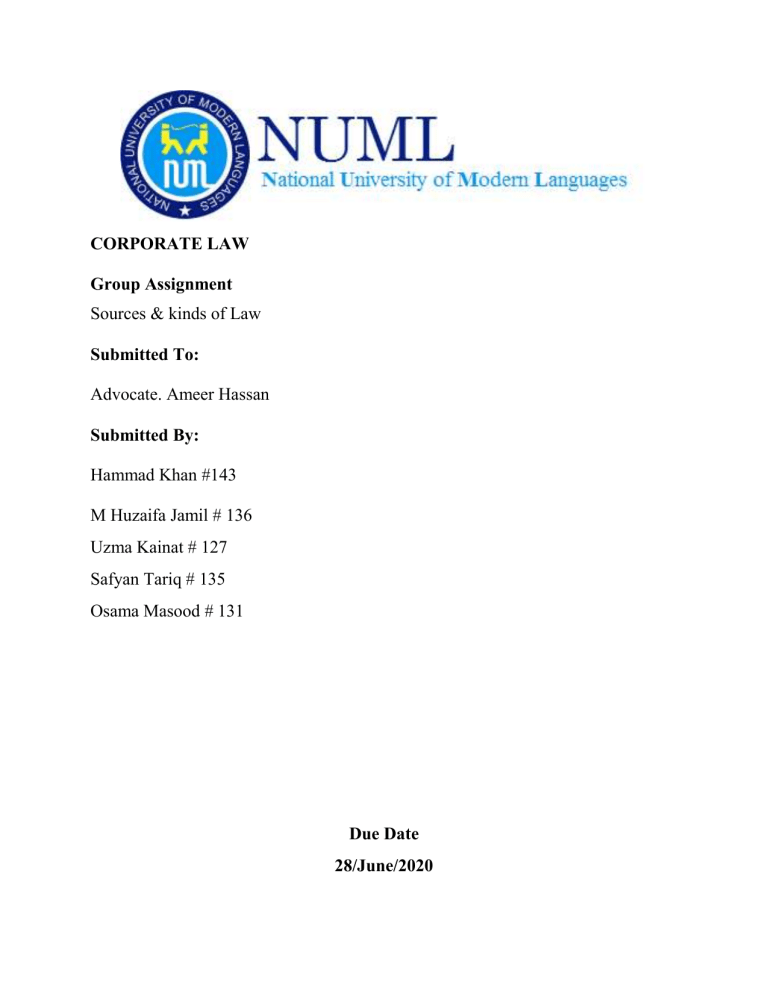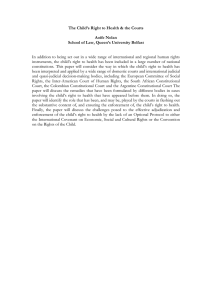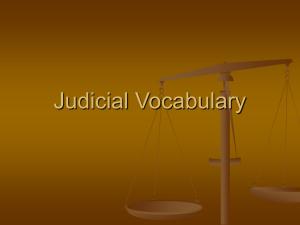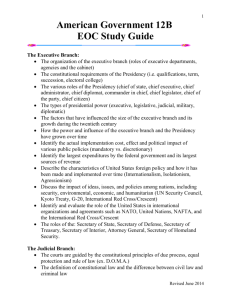
CORPORATE LAW Group Assignment Sources & kinds of Law Submitted To: Advocate. Ameer Hassan Submitted By: Hammad Khan #143 M Huzaifa Jamil # 136 Uzma Kainat # 127 Safyan Tariq # 135 Osama Masood # 131 Due Date 28/June/2020 Law and its Sources and Kinds Diagram: Kinds Of laws National Law Constitutional Law International Law Ordinary Law Private Laws Public Laws General Public Law Administrative Law Definition of Law: Law means “Definite” and it is defined as “a uniform rule of conduct which Is applicable equally to all the people of the state.” Sir John Salmond defines law as: “Law is a body of principles recognized and applied by the state in the administration of justice” John Austin’s defines law as: “Law is the aggregate set of rules set by a man as politically superior or sovereign to men, as political subjects.” Sources of Law Sources of law are as follows: 1. Custom: In ancient times social relations gave rise to several usages, traditions and customs. Initially social institutions begin working on the basis of several accepted customs. Gradually the state emerged as the organized political institution of the people having the responsibility to maintain peace, law and order. It also began acting by making and enforcing rules based upon customs and traditions. it is said to be a basic source of law. 2. Religion and Morality: We accepted religion and religious codes as superior heavenly forces and worship. Religion that starts regulating the behavior of people and compelling the people to accept and obey religious codes. The rules of morality also appear in society which defines what was good and what was bad, what was right and what was wrong. So religion and morality has also been important sources of law. 3. Legislation: The state depending upon custom and degrees or orders of keeping for regulating the behavior of people. Later on the legislation emerged as an organ of the Government. it began transforming the customary rules of behavior into definite and enacted rules of behavior of the people and it became the cheap source of law. 4. Delegated Legislation: Because of several pressings reasons like lack of time, lack of expertise and increased demand for law making the legislation of the state find it essential to delegate some if its law making powers of executives. The executives then make law/rules under the system. Delegated legislation always works under the superior law making powers of the legislation. 5. Judicial decision(precedent): Judicial decisions are the decisions or judgements passed by superior courts of the country. The judicial decisions are binding on the parties to the case and also get accepted as law for future cases. Only the judicial decisions given by the apex courts or the courts which stands recognized as the courts of record like Supreme Court and High courts are recognized and used as law proper. Lower courts can settle their cases on the basis of such judicial decision. These judicial decisions are also called precedent. 6. Equity: Equity means fairness and sense of justice. In all cases where laws are silent in some respect, the judges depend on equity and act in accordance with their sense of fair play and justice. Equity is used to provide relief to the aggrieved party and such decisions performed the functions of laying down rules for the future. As such equity acts as a source of law. e.g. stay is the equity relief Kinds of Law There are two main kinds of law National law International law National Law: National law includes the orders and commands of the superior authority of the state and it is administered by the sanction or fear of sanction of the physical force of the state. By this virtue of national law, we can safely call it as an imperative law. National law is only applicable inside a country. Since every country has their own laws hence national law is different for different countries. National law is further classified in two categories: Constitutional law Ordinary law Constitutional law: Constitutional law is the supreme law of the country. The constitutional law lays down the organization, power, functions and interrelationship of the three organs of govt (i.e. legislation, judiciary, and executive). It also lays down the relationship between the people and the govt as well as the rights, fundamental rights and duties of citizen. It can be called “law of laws”. In the sense all law making in the state is done on the basis of powers, granted by the constitutional law. e.g.: constitutional of Islamic Republic of Pakistan 1973 Ordinary Law: It is also called national or municipal law. It is made by legislature and it determines and regulates and conduct the behaviour of the people.it lays down the relation among the people and their associations, organizations, groups and institutions. The legislature makes laws, the executive implements these laws and judiciary interprets and applies these laws to specific cases. Ordinary law is further classified into two categories: Private law Public law Private law: Private law regulates the relations among individuals. It lays down rules regarding the conduct of the individuals in society and their relations with other persons. It guarantees the enjoyment of their rights. Through this law the state acts as the arbiter of disputes between any two individualsor their groups. e.g. law of torts, law of contracts, law of trust etc. Public law: The law which regulates the relation between the individuals and the state is public law. It is made and enforced by the state on behalf of community. e.g. criminal law and administrative law. Two types of public law are: General law and special law Administrative law General Law: General Law applies to all the citizens in their relations among state general law consists of the ordinary law of the land. General Law consists of those legal rules which are taken judicial notice of by the courts whenever there is a occasion for their application. Special law: Special law consists of certain other bodies of legal rules which are so special and exceptional in their nature sources or application that it is inconvenient to treat them as standing outside the general and ordinary law. Special law consists of the legal rules which court will not recognize and apply them as a matter of course but which must be specially proved and brought to the notice of the courts y the parties interested in the recognition . Kinds of special law: a) local law: Local law is the law of particular locality and not the general law of the whole country there may be customs which have obtained the position of law in certain locality and within those localities ,that customary law supersedes the general law E.g the Madras city improvement trust act.1950 applies only to the city of madras. b) Foreign law: It is essential in many cases to take account of a system of foreign law and to determine the rights and liabilities of the parties or that basis ignorance of law is no excuse and everyone is supposed to No the law of the land. However ignorance of foreign law is like the ignorance of fact and can be excused. b) Conventional law: Conventional law has its sources in the Agreement of those who are subject to it. Agreement is law for those who make it Example of conventional law or the rules of a club or a cooperative society. Some other examples of conventional law are the articles of Association of a company, articles of partnership e.g. c) autonomic law: By autonomic law is meant that species of law which has its sources in various forms of subordinate legislative authority possessed by private persons and bodies of persons .A railway company may make bye-laws for regulating is traffic. Likewise as University makes statues for the government of its members. An incorporated company can alter its articles and impose new rules and regulations upon the shareholders. Although autonomic law is not incorporated into the general law of the community these rules are constitutedBythe exercise off autonomic powers of private legislation Autonomic laws are made by autonomous bodies for the government of their members. Administrative Law: It lays down the rules governing that exercise of the constitutional authority which stands delegated by the constitution of the state to all the organs of the govt. it also governs the relationship between the civil servants and the public servants and lays down the relation between civil servants and the state. International Law: International law is a collection of rules governing relations between states. It is a mark of how far international law has evolved that this original definition omits individuals and organizations. Furthermore, it is no longer accurate to view international law as simply a collection of rules; rather, it is a rapidly developing complex of rules and influential though not directly binding principles, practices, and assertions coupled with increasingly sophisticated structures and processes. International law provides normative guidelines as well as methods, mechanisms, and a common conceptual language to international actors i.e. primarily sovereign states but also increasingly international organizations and some individuals. Although international law is a legal order and not an ethical one, it has been influenced significantly by ethical principles and concerns, particularly in the sphere of human rights. Lord Parker writes: “The law which the prize courtis toadminister is not national law or as it is sometimes called, the municipal law, but the law of nations-In other words international law. Of course the price quote is a municipal coat and it's decrease and orders or their validity to municipal law. The law it enforces me therefore in one sense be considered a branch of municipal law “ Some other kinds of law are Imperative law Physical or scientific law Natural laws Conventional law Customary law Technical law Imperative law: According to salmond: “Imperative law means a rule which prescribes a general course of action imposed by some authority which enforces it by superior power either by physical force or any other form of compulsion “The chief advocate of imperative law is Austin who defines law as a command which obliges a person or persons to a course of conduct. Physical law: According to salmond: “Physical laws or the laws of science are expressions of the uniformities of nature general principles expressing that regularity and harmony observable in the activities operations of the universe” An example of physical law is the law of tides physical law also called natural laws or laws of nature there is uniformity and regularity in those laws they are not the creation of men and cannot be changed by them.human law change from time to time and country to country but physical laws are invariable an immutable for ever. Natural laws: According to Salmond: “By natural law or moral law is meant the principles of natural right and wrong principles of natural justice we use the term justice in its wildest sense to include all forms of rightfulaction” Conventional law: According to salmond, conventional law means “Any role of system or rules agreed upon by persons for the regulation of their conduct towards each other” It is a form of special law.it is law for the parties who subscribe to it example of conventional law are the laws of cricket or any other game, rules and regulation of a club or any other voluntary society. Conventional law in some cases is enforced by the state.When it is enforced by the state it becomes a part of the civil law the view of some writers is that international law or the law of nations is also a kind of conventional law on the ground that its principles are expressly or impliedlyagreed upon by the state concerned. Customary law: According to salmond “customary law means any rule of action which is actually observed by men And it will which is the expression of some actual uniformity of some voluntary action” A custom may be voluntary and still it is law when a custom is firmly established, it is enforced by the authority of the state customary law is an important source of law. This is particularly so among the conservative people who want to keep as much of the past as possible, Customary law came into existence due to a number of reasons when some kind of action gets general approval and it is generally observed for a long time it becomes a custom, sometime custom come into existence on the ground of expediency. Other reasons for their coming into existence or imitation, convenience e.g. when they are recognized by the state they become a part of the civil law. Practical law: Practical or technical law consists of rules for the attainment of certain ends example the laws of health, the laws of architecture etc these rules guide us as to what we ought to do in order to attain a certain end within this category comes the laws of music, laws of architecture, laws of style Etc Conclusion: Source of law must not be construed as the authority sanctioning or enforcing a law. It should mean the agency from which the law originates, or can say from where the rule of action has come into existence. That is why Giorgio Del Vecchio regards the nature of the man as the source of law





